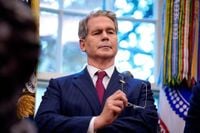Argentina’s political and economic turmoil has taken center stage on the global scene, as the United States steps in with a massive $20 billion bailout package intended to stabilize the South American nation’s faltering economy and shore up the embattled presidency of Javier Milei. The intervention, announced by U.S. Treasury Secretary Scott Bessent on October 1, 2025, comes at a time of mounting crises for Argentina—ranging from spiraling poverty and currency collapse to a high-profile corruption scandal within Milei’s own inner circle.
The bailout package, which includes a $20 billion credit line, currency swaps with Argentina’s central bank, and the purchase of government bonds, is being described by Bessent as a “bridge to the election.” The crucial legislative vote is set for October 26, and the financial lifeline is designed to help President Milei’s Libertad Avanza Party weather the economic storm until then. According to Popular Information, the rescue effort was announced amid a dramatic plunge in Argentine bond prices and a 6% drop in the peso, which forced the central bank to burn through a billion dollars in reserves just to stabilize the currency at 1,380 pesos per dollar.
The U.S. government’s intervention has not been without controversy. Reports by Popular Information revealed that the bailout directly benefits Rob Citrone, a billionaire hedge fund manager and longtime friend of a former colleague of Treasury Secretary Bessent. Citrone’s firm, Discovery Capital, has invested heavily in Argentine bonds and companies since Milei’s election. Without the U.S. package, those investments would be at far greater risk of default. Argentine media even reported that Citrone personally intervened to request the bailout from Bessent, raising uncomfortable questions about the influence of wealthy American investors on U.S. foreign policy.
Pressed by CNBC’s Joe Kernen to justify the bailout, Bessent dismissed concerns that the package was designed to help Americans with financial interests in Argentina. “This trope that we are helping Americans with interests down there couldn’t be more false,” Bessent insisted. However, as Popular Information noted, it is objectively true that Citrone stands to benefit from the taxpayer-funded rescue. Bessent instead argued that the bailout was in the “strategic interest” of the U.S., asserting that Argentina serves as a “beacon” of right-wing economics for other Latin American countries and warning against allowing the country to become a “failed state.”
President Donald Trump has thrown his full support behind Milei, calling him a “truly fantastic and powerful leader” during a meeting at the United Nations General Assembly in late September. The contrast with Trump’s adversarial approach toward Brazil’s left-leaning President Luiz Inácio Lula da Silva—whose country faces steep U.S. tariffs—could not be more pronounced. As The Economist observed, “Trump is offering this lifeline solely because he doesn’t want his libertarian pal’s wild economic project to fail. Uncle Sam is now underwriting Milei’s laboratory.”
For Milei, the stakes could hardly be higher. Once hailed as the “golden boy” of global politics, the eccentric former TV pundit and self-described anarcho-capitalist has seen his fortunes wane in recent months. Since taking office in 2023, Milei’s radical program of slashing government spending and regulation—nicknamed the “chainsaw” approach—initially delivered some headline-grabbing results. Inflation, which had soared to 211%, dropped to 43%, and Argentina posted a fiscal surplus in January 2025 for the first time in 14 years.
Yet the cost has been staggering. According to government statistics from June 2024, more than half of Argentina’s population now lives in poverty, with nearly two-thirds of children under 14 affected. The poverty rate has nearly doubled since 2019, largely as a result of Milei’s aggressive austerity measures, which drastically reduced spending on social programs. As the October mid-term elections approach, economists warn that the U.S. financial support may only postpone a painful currency devaluation until after the vote, when Argentina may be forced to let the peso float more freely.
Milei’s troubles are not limited to the economy. Early September saw his party suffer a shock defeat in Buenos Aires provincial elections, sending markets into a tailspin and prompting the central bank’s emergency intervention. Meanwhile, his administration has been rocked by an explosive corruption scandal involving his sister, Karina Milei, who wields enormous influence as Secretary General of the Presidency. According to El País and Buenos Aires Times, an aide was recorded claiming Karina took a 3% cut of state pharmaceutical contracts—a charge she and the president vehemently deny. Despite the growing controversy, Milei has stood by his sister, describing her as a vital emotional support since childhood and dismissing the allegations as lies.
“A foolish loyalty maybe,” wrote James Neilson in the Buenos Aires Times, “but he has clearly learnt from some of his other mistakes.” Observers note that Milei has toned down his once-combative rhetoric, shifting from an insult-hurling firebrand who governed by decree to a more measured, technocratic leader in the run-up to the midterms. The hope, it seems, is to retain the support of moderates who helped propel him to victory in 2023, even as Peronist opposition parties scent blood and seek to capitalize on his vulnerabilities.
Complicating matters further, Argentina has been shaken by a wave of social unrest. The weekend before October 1, massive demonstrations filled the streets of Buenos Aires as citizens demanded accountability for the brutal killings of three young females—two women and a 15-year-old girl—whose deaths were broadcast live online. Authorities have arrested nine suspects, including the alleged mastermind, a 20-year-old Peruvian drug trafficker detained in Peru. The case has cast a harsh spotlight on the country’s epidemic of gender-based violence; monitoring organizations report that a woman dies at the hands of a man approximately every 36 hours in Argentina.
As the October 26 mid-term elections approach, the future of Milei’s government—and perhaps the trajectory of Argentina’s economic experiment—hangs in the balance. The $20 billion U.S. bailout may buy Milei time, but it has also exposed deep rifts over the role of foreign money, the influence of wealthy investors, and the human cost of radical austerity. With poverty rising, scandals swirling, and the peso perpetually on the brink, the world is watching to see whether Argentina’s latest gamble will pay off—or end in yet another chapter of crisis.
For now, the only certainty is that the stakes for Argentina—and its people—have never been higher.



